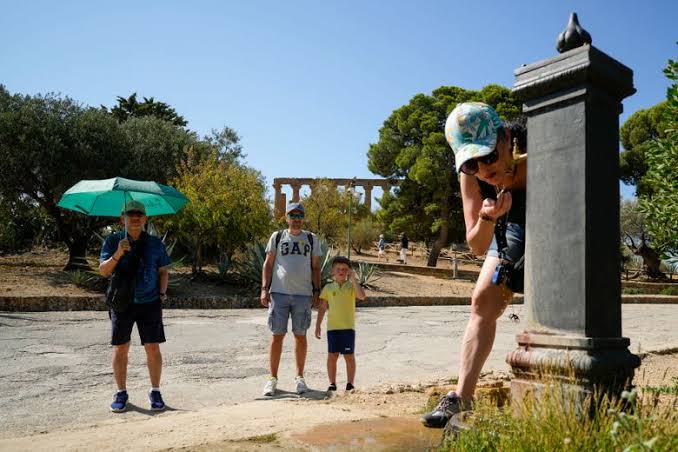Sicilians Manage Drought So Well That Tourists Don’t Notice, But Record Dry Year Could Change That
Sicily, renowned for its stunning landscapes and rich history, is currently grappling with an unprecedented drought that threatens to disrupt both daily life and the tourism industry. Despite a near-total lack of rain this year, water continues to flow abundantly for tourists, with the famous fountains at Agrigento’s archaeological park and hotel pools remaining full. This remarkable resilience in water management ensures that visitors experience no interruptions, but the situation behind the scenes is becoming increasingly dire for the island’s residents.
Sicily, like many Mediterranean regions, has a long history of coping with limited rainfall. The islanders have honed techniques to maximize water conservation, such as storing rainwater in cisterns and relying on tankers to deliver water during dry spells. These methods have been crucial in maintaining a steady water supply, particularly in areas catering to tourists. However, human-caused climate change has exacerbated the frequency and severity of droughts, pushing the island’s resources to their limits.

Sicilians expertly manage water amid a severe drought, keeping tourists unaware of the struggle—but how long can they sustain it?
This year has been exceptionally challenging, with Sicily experiencing one of its driest periods on record. The lack of rainfall has led to dry lakes and scorched fields, yet the infrastructure supporting tourism remains well-maintained. The continued availability of water for tourists is a testament to the island’s effective water management strategies. However, this facade of abundance masks a growing crisis for local residents, who are increasingly at risk due to the dwindling water supply.
The island’s water distribution practices prioritize tourist areas to maintain the local economy, which heavily depends on tourism. This approach, while understandable, raises concerns about the sustainability of such practices as droughts become more frequent and severe. The water needed for essential services and agriculture is becoming scarcer, putting a strain on the local population and their livelihoods. Farmers are particularly affected, as the dry conditions make it difficult to sustain crops, leading to potential food shortages and economic hardship.
The situation in Sicily highlights the broader challenges faced by Mediterranean regions in adapting to changing climate conditions. As droughts become longer and more intense, traditional water management techniques may no longer suffice. The need for innovative solutions and greater investment in sustainable water infrastructure is becoming increasingly urgent. This includes not only enhancing water storage and distribution systems but also promoting water conservation practices among both residents and tourists.
While tourists may not immediately notice the effects of the drought, the long-term implications for Sicily’s environment and economy are concerning. The island’s natural beauty and cultural heritage are at risk if current trends continue. The balance between supporting tourism and ensuring sufficient water supply for all residents is delicate, and the ongoing drought serves as a stark reminder of the need for comprehensive climate adaptation strategies.

Despite record drought, Sicily’s tourism hotspots remain lush and welcoming. But behind the scenes, the island faces a severe water crisis.
In conclusion, Sicily’s adept handling of water resources amidst severe drought conditions has so far shielded tourists from the harsh realities faced by local residents. However, the record dry year underscores the growing vulnerability of the island to climate change. As the situation evolves, it is crucial for policymakers and communities to collaborate on sustainable water management practices that can support both tourism and the well-being of the local population.